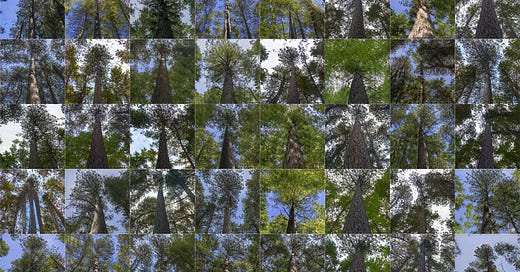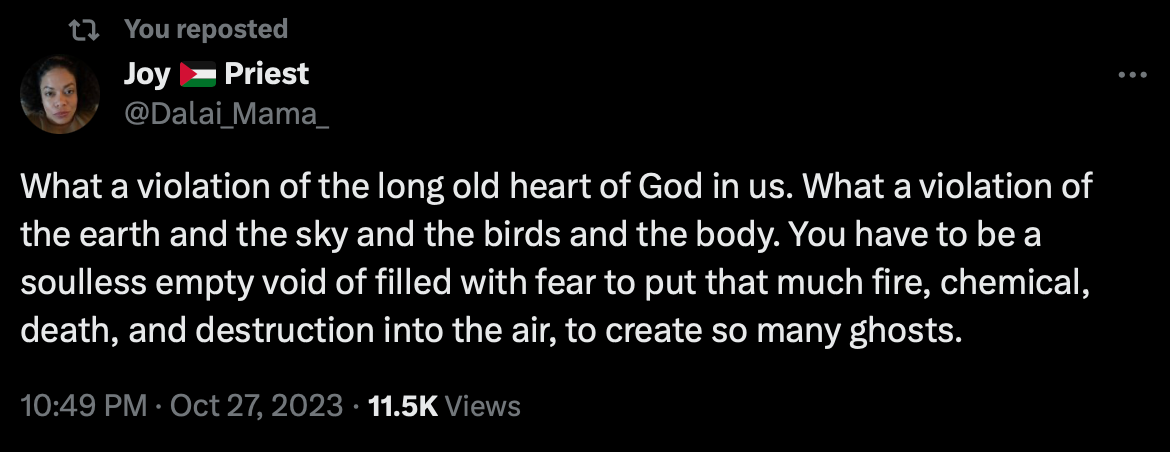Hi Folks,
It’s been a while since I posted a resource roundup here; I’d like to first apologize for that, but also to check in. Frankly, it hasn’t felt all that useful to post these in the context of the world—even when I know sharing resources is more important than ever. This has been a strange semester here in Chapel Hill, riddled with violence and uncertainty from start to finish. I’m straddling a line of both sharing my work with the larger academic world (ie: believing in its importance) and feeling that almost nothing matters in a world where we can willfully allow a genocide to happen, where the voices of the people feel powerless against those in charge, where so little of what I have to say makes any difference at all. I say this not in service of wishing to be reminded that my voice matters, but in service of a reminder that our voices are far more powerful as a collective—and bringing those voices together in collectively is really, truly, the core of what we do here at Good Folk.
With that, I’d like to point to a statement of solidarity with the people of Palestine that was written by some graduate students in our American Studies and Folklore department here at UNC, myself included. I am very proud to learn and work alongside these folks, and to call for an immediate ceasefire, support of the American Studies Association’s pursuit of the Boycott, Divest, Sanctions (BDS) movement, and to encourage us all to look closer at America’s role in global conflict. Please feel free to share this statement.
Over the last few weeks, I have spoken to many individuals who support the movement for Palestinian freedom behind closed doors but are afraid to speak out for fear of losing employment, support, or even close relationships in their life. At my alma mater, Columbia students involved in Arab student groups are being threatened by a “doxxing truck” on campus, even when they are not being outspoken about the genocide. How sad for universities to allow their students to be treated this way. How frightening that we are all so afraid to speak out against a global genocide, which should never be this controversial. How terrifying that so many of the “liberal” (ie: mostly private) universities are the ones in fact causing the greatest harm. I’d like to point here to what I feel is the most important line in our statement for scholars of the field: “To trade in the language of decoloniality while acquiescing to the pursuit of genocide through our silence betrays the values to which we claim to aspire.”
There are many excellent people writing about this conflict; I have found myself drawn especially to
’s Seeda School; ’s How To Cure A Ghost; and ’s Care Ecology. Haymarket Books is offering free e-books about Palestinian history for those who wish to learn. I have been grateful to those on my social media feeds who have been relentless in their coverage, both on the ground in Palestine and from distant shores. I am finding these days that I cannot look away, cannot think of anything else, cannot possibly go on with life as normal while more lives are lost each day. It has been an entire month since I wrote to you about my time in the Middle East and the importance of paying close attention, and all of that still holds true. I cannot—and will not—look away.Adia Victoria has been one of my favorite artists for years, but her words on Palestine have rung loud and true.
These words as well, from Joy Priest.
I have revisited this Naomi Klein piece on environmentalism, Edward Said, and the idea of creating “sacrifice zones” around the world so many times this month.
Said helps us imagine what that might look like as well. He helped to popularise the Arabic word sumud (‘to stay put, to hold on’): that steadfast refusal to leave one’s land despite the most desperate eviction attempts and even when surrounded by continuous danger. It’s a word most associated with places like Hebron and Gaza, but it could be applied equally today to residents of coastal Louisiana who have raised their homes up on stilts so that they don’t have to evacuate, or to Pacific Islanders whose slogan is ‘We are not drowning. We are fighting.’ In countries like the Marshall Islands and Fiji and Tuvalu, they know that so much sea-level rise is inevitable that their countries likely have no future. But they refuse just to concern themselves with the logistics of relocation, and wouldn’t even if there were safer countries willing to open their borders – a very big if, since climate refugees aren’t currently recognised under international law. Instead they are actively resisting: blockading Australian coal ships with traditional outrigger canoes, disrupting international climate negotiations with their inconvenient presence, demanding far more aggressive climate action. If there is anything worth celebrating in the Paris Agreement signed in April – and sadly, there isn’t enough – it has come about because of this kind of principled action: climate sumud.
But this only scratches the surface of what we can learn from reading Said in a warming world. He was, of course, a giant in the study of ‘othering’ – what is described in Orientalism as ‘disregarding, essentialising, denuding the humanity of another culture, people or geographical region’. And once the other has been firmly established, the ground is softened for any transgression: violent expulsion, land theft, occupation, invasion. Because the whole point of othering is that the other doesn’t have the same rights, the same humanity, as those making the distinction. What does this have to do with climate change? Perhaps everything.
Saw this band play last night at Cat’s Cradle alongside Slaughter Beach, Dog, and I have not stopped listening to this song since.
This one too.
Imagining the ghost forest, by Everest Pipkin for Mn Artists.
And from The Assembly, a piece on Why Some Stay—important to consider both in terms of localized crisis and disaster and global conflict. There is power in refusing to turn away. There is something to be said for that kind of community.P
One of the best pieces I’ve read recently about the importance of ideas of place: Wyatt Williams on Lucinda Williams and Louisiana for The Bitter Southerner. So good. So so good.
“I quit my job in Atlanta that same month and moved to Bali, which is as far on this planet as you can get from that gas station. There were some days over there that I entertained the idea of never coming back, one way or another. What I found in Bali were beautiful people who grew rice and liked to go to cockfights on the weekend and barbecue pigs and make moonshine and play music and believe that there was little barrier between our physical world and the one of ghosts and spirits. What I mean to say is that I glimpsed just a fraction of the enormous beauty of that place, and all my heart could recognize in it was the idea of Louisiana. I knew then that I would never escape it.
I moved back in 2020, ended up just on the other side of the river in Mississippi with a group of friends. The water was high that year and the casino had to bring in pumps to keep the river out of the gambling floor. We caught catfish on trot lines and cut them up and fried them for dinner night after night. We foraged for mushrooms and picked buckshot out of wild turkeys and soaked their breasts in buttermilk, and on the very best of days, drove over the bridge into Louisiana, where a drive-thru liquor store would sell double-strength frozen daiquiris in Styrofoam cups, and we’d drive home drinking with windows down as the sun set on the river bluff. I’m leaving out a lot of parts of this story and telling some of it out of order and don’t particularly care if it makes sense. There was a blond woman from Mississippi I fell in love with on account of her voice; it didn’t work out. But if you asked for an explanation why I love this place, the only answer would be just the same as why I hate it. There aren’t enough hours in the day.”
In southern Chile, at age twenty, I spent a week living deep in the Andes amongst water rights activists, hiking guides, and large families who welcomed me in. There, riding in the backseat of trucks on the way to get vegetables at the local market, stargazing and drinking beer with my host brothers in the backyard, and staring out at the sprawling fields of sheep grazing in the grass, all I could see was the North Carolina I remembered and had been haunted by all my life. Like Williams, I knew in that moment that I could never leave it. And like Williams, I moved back in 2020, living amongst a group of friends in a strange small town. I love this place. I hate this place. I do not think I will ever be able to go anywhere else and not think of it.
I always come back to this poem by Cameron Awkward-Rich. Like you, I was raised dreaming. Like you, I keep my hand on my heart. Hand on my stupid heart.








Spencer, sending so much love 🖤 We all we got!